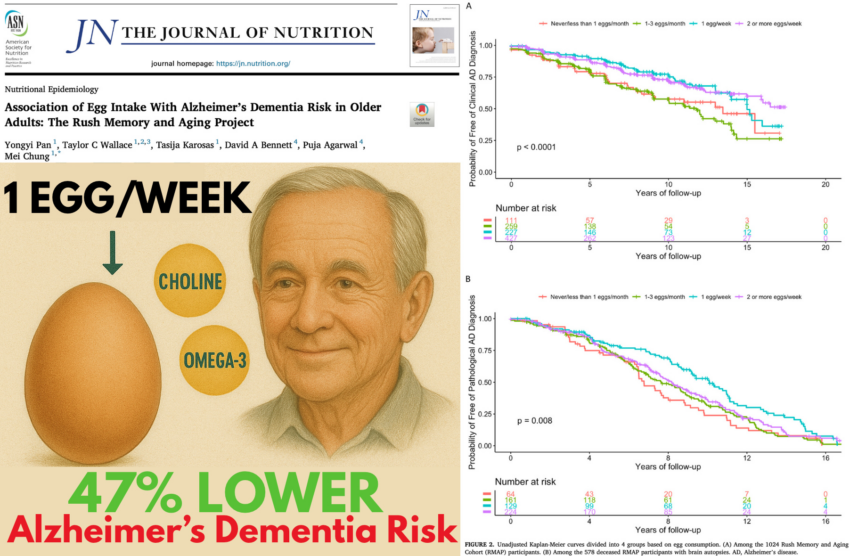Alzheimer’s disease now affects an estimated 6.9 million Americans over 65, with numbers projected to more than double by 2060. There’s currently no cure — making prevention strategies critical.
A recent study by Pan et al followed 1,024 older adults (average age 81) in the Rush Memory and Aging Project for an average of 6.7 years. Participants underwent annual cognitive assessments and lifestyle surveys, and a subgroup even donated their brains for postmortem analysis.
The results? Eating just one or more eggs per week was linked to a ~47% lower risk of developing Alzheimer’s dementia — and the protection may be partly due to choline, a brain-essential nutrient found abundantly in eggs. This is the first U.S. study to examine egg intake against both clinical Alzheimer’s diagnoses and physical brain pathology.
KEY FINDINGS
-
Lower Dementia Risk
-
1 egg/week → 47% lower risk of Alzheimer’s dementia (HR: 0.53)
-
≥2 eggs/week → also 47% lower risk (HR: 0.53) compared to <1 egg/month.
-
-
Brain Pathology Link
-
In 578 autopsied participants, higher egg intake was tied to significantly fewer Alzheimer’s-related brain changes, including amyloid plaques and neurofibrillary tangles.
-
-
Choline’s Role
-
Mediation analysis found ~39% of the protective effect came from dietary choline, which supports acetylcholine production for memory and learning, and maintains healthy cell membranes.
-
-
Nutritional Advantage
-
Eggs also provide omega‑3 fatty acids and lutein, both linked to improved cognitive function and reduced neuroinflammation.
-
This study suggests that eating just a few eggs a week could be an easy, affordable step to help lower Alzheimer’s dementia risk — especially for older adults.
Epidemiologist and Foundation Administrator, McCullough Foundation
www.mcculloughfnd.org
Please consider following both the McCullough Foundation and my personal account on X (formerly Twitter) for further content.
Click this link for the original source of this article.
Author: Nicolas Hulscher, MPH
This content is courtesy of, and owned and copyrighted by, https://petermcculloughmd.substack.com and its author. This content is made available by use of the public RSS feed offered by the host site and is used for educational purposes only. If you are the author or represent the host site and would like this content removed now and in the future, please contact USSANews.com using the email address in the Contact page found in the website menu.








